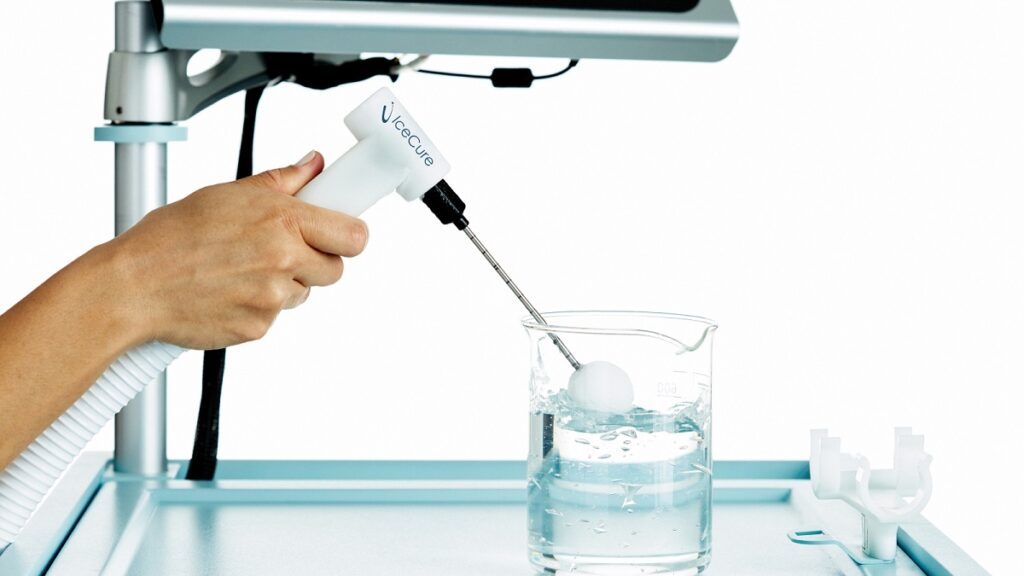Israeli biomedical company IceCure Medical, the developer of technology that freezes cancerous tumors, announced positive results this week from the company’s clinical trial for the use of its ProSense flagship system for cryoblation of small low-risk breast cancer tumors.
The ProSense is a liquid-nitrogen-based cryoablation system used in the treatment of patients with T1 invasive breast cancer or patients who are not suited for surgical alternatives for the treatment of breast cancer.
The system is one of two cryoablation systems developed by IceCure for treating malignant and benign tumors. The treatments involve streaming liquid nitrogen in a closed circuit and then freezing the tumor with a unique needle developed by IceCure. The company says the healthy tissue remains untouched.
The IceSense3 (ICE3) trial began in 2014. The company claims it is the “largest controlled multisite clinical trial conducted in the US for liquid nitrogen-based cryoblation of early-stage malignant breast tumors.” The study was conducted in 19 hospitals and medical centers across the US, including the Columbia University Medical Center. The trial enrolled and treated 194 patients at 55 years of age or older (average age of 75) with low-risk, early-stage breast cancer tumors measuring up to 1.5cm (0.59 inches).
Patients were treated with the minimally invasive ProSense Cryoblation System and treatments ranged from 20 to 40 minutes depending on the location and size of the tumor. The treatment did not require surgical incision or scarring,” the company said.
According to the findings, at a mean of 34.83 months following treatment with ProSense, 2.06 percent (4 patients) experienced cancer recurrence. The statistical analysis indicated that the chance of non-recurrence in a population of patients treated with ProSense with low-risk breast cancer in early stages, and up to 1.5 cm tumor size, for a period of up to three years, is between 94.58 percent and 99.89 percent, with a statistical significance (confidence level) of 95 percent, the company said.
Dr. Richard Fine, an ICE3 investigator who serves as Program Director of the Breast Surgical Oncology Fellowship and as Director of Research and Educationat the West Comprehensive Breast Center in Germantown, Tennessee presented the results at the 22nd Annual Meeting of the American Society of Breast Surgeons (ASBrS). He was previously Chairman of ASBrS.
In a statement issued by the ASBrS, he said that “cryoablation potentially represents a dramatic improvement in care for appropriate low-risk patients, and at three years post-treatment, the ICE3 trial results are extremely positive. The non-invasive procedure is fast, painless and can be delivered under local anesthesia in a doctor’s office. Recovery time is minimal and cosmetic outcomes are excellent with little loss of breast tissue and no scarring. Now, this trial is underscoring the efficacy and safety of the procedure for this patient group.”
“Less aggressive therapies can be as effective and deliver greater patient satisfaction at a lower cost than traditional interventions,” said Dr. Fine. “In keeping with that trend, cryoablation is a promising, high value treatment for certain forms of less aggressive cancers.”
“We are extremely encouraged by the strong interim results from our ICE3 trial,” said Eyal Shamir, CEO of IceCure. “These results further validate ProSense as a safe and effective minimally-invasive cryoablation approach to tumor destruction, and we look forward to continuing our productive dialogue with the ASBrS and the FDA on advancing the process of making this valuable technology available for patients with malignant breast tumors. We are hopeful that this data, combined with the FDA’s Breakthrough Device Designation, will help expedite commercialization of ProSense for breast cancer treatment in the US.”
IceCure said that it expected that by June 2021, there will be 49 patients that will have completed a five-year follow-up, 41 patients that will have completed a four-year follow-up, 39 patients that will have completed a three-year follow-up, and 51 patients that will have completed a two-year follow-up.
Related posts

Israeli AI Safety Tool Among TIME’S Best Inventions For 2024

TAU Team Discovers Mechanism To Eliminate Cancerous Tumors

Ashdod Port Investing In Startups As Part Of Innovation Strategy




Facebook comments